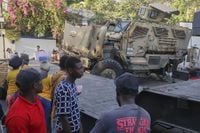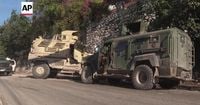On the evening of August 31, 2025, tragedy struck the Multinational Security Support Mission (MSS) in Haiti when a road accident involving two armored vehicles claimed the life of Corporal Kennedy Mutuku Nzuve, a Kenyan police officer, and left a trail of grief and questions for the international force striving to restore order in a country besieged by gang violence.
The accident occurred at approximately 5:00 p.m. along the winding Kenscoff–Pétion-Ville road at Pèlerin 9, a mountaintop stretch just outside Port-au-Prince. According to statements from MSS officials and reports by the Associated Press and local outlets, the incident unfolded during a recovery operation involving two MaxxPro armored vehicles, the largest of their kind donated by the United States for the mission. One of the vehicles, while towing a disabled counterpart, developed mechanical problems. As fate would have it, the lead vehicle crashed into a wall, and the towed vehicle subsequently overturned, resulting in a scene of chaos and devastation.
Corporal Nzuve was rushed to Lambert Santé Hospital in Pétion-Ville, but despite the efforts of medical personnel, he was pronounced dead. The accident also claimed the lives of two civilians and left eight MSS officers injured, three of whom were in serious condition and required emergency airlift to the neighboring Dominican Republic for specialized treatment, as reported by CMC and the MSS spokesperson Jack Ombaka. The injured were transported to the hospital with the help of local residents, the Haitian National Police (PNH), and the Forces Armées d’Haïti (FAd’H), whose swift action in the aftermath was commended by MSS leadership.
The loss of Corporal Nzuve, born on March 8, 1984, in Machakos County, Kenya, was met with an outpouring of grief from colleagues and international partners. Nzuve had joined the National Police Service in 2005, later serving with the Rapid Deployment Unit (RDU), and was known for his courage and unwavering commitment. Before his deployment to Haiti as part of Kenya’s third contingent to the MSS, he had distinguished himself in operations in Narok and Baringo counties back home. “Corporal Kennedy Mutuku Nzuve was pronounced dead at Lambert Santé Hospital in Pétion-Ville,” MSS said in a statement published by Radio Africa and other outlets. “He consistently demonstrated courage, dedication, and unwavering commitment until his untimely passing.”
On Monday, September 1, 2025, a solemn memorial service was held at the main dining facility at LSA1 in Port-au-Prince. The gathering brought together MSS personnel from Kenya, the Bahamas, Jamaica, El Salvador, and Guatemala, as well as representatives from partner organizations such as DMG, Amentum, Aspen, and GardaWorld. In a poignant display of unity, the multinational force mourned not only the loss of their comrade but also the civilians whose lives were cut short. Corporal Nzuve’s remains were later flown to the Dominican Republic for preservation before their final journey home to Kenya, where the National Police Service pledged to support his family through the repatriation process.
The United States, a key supporter of the MSS and donor of the armored vehicles involved, expressed its condolences in a statement on X, formerly Twitter: “The United States is deeply saddened by the MSS vehicle accident … Our thoughts and prayers are with the families and friends of those who passed and wish a speedy recovery for those injured.”
This deadly incident has cast a somber shadow over the MSS mission, which has been operating in Haiti since June 2024. Kenya leads the UN-backed multinational effort, with 800 officers currently deployed and more expected to arrive in the coming weeks, according to the National Police Service and the Associated Press. The mission’s mandate is to assist the Haitian authorities in combating rampant gang violence that has all but paralyzed the capital, Port-au-Prince, and left large swathes of the country beyond the reach of the state. Since the assassination of President Jovenel Moise in 2021, Haiti’s political and security crisis has only deepened, with a presidential transition council now promising elections by February 2026.
The road accident marks the third fatality among Kenyan MSS officers in Haiti since the start of the mission. One officer was previously killed in a gang attack, while another remains missing and is presumed dead, as reported by the Associated Press. The security effort has also seen casualties among Haitian police, including two SWAT officers killed in a drone attack less than two weeks before the accident. The risks faced by MSS personnel are underscored by the grim statistic that at least 3,141 people have been killed in Haiti during the first half of 2025 alone, according to the UN High Commissioner for Human Rights.
In the wake of the accident, MSS officials extended gratitude to the local Haitian forces and residents who aided in the rescue and evacuation effort. “From all of us at MSS-Haiti, our thoughts and prayers are with Corporal Nzuve’s family, friends, and colleagues as they grieve this profound loss. We also wish a speedy recovery to those injured, who are thankfully out of danger,” the mission said in a widely shared statement. The National Police Service of Kenya, through spokesman Muchiri Nyaga, confirmed that the next of kin had been notified and that arrangements for repatriation and continued medical care for the injured were underway.
Beyond the immediate tragedy, the accident has reignited concerns about the challenges facing the MSS mission. Despite an initial plan to deploy 2,500 police officers from several countries, only about 1,000 have arrived in Haiti so far, including more than 700 from Kenya. The mission’s capacity to meet the growing security challenge has been questioned in a letter co-signed by the United States, Canada, El Salvador, Guatemala, Jamaica, Kenya, and the Bahamas, urging the UN Security Council to strengthen the multinational force. During a recent Security Council meeting, acting US envoy Dorothy Shea emphasized the need for a better-resourced force “to hold territory, secure infrastructure, and complement the Haitian National Police.”
For now, the MSS continues its work under difficult and often dangerous conditions, striving to bring stability to a nation in turmoil. The memory of Corporal Kennedy Mutuku Nzuve, described by his colleagues as courageous and deeply committed, now stands as a stark reminder of the risks and sacrifices involved in this international effort.
As Haiti’s future hangs in the balance, the loss of one dedicated officer resonates across continents, underscoring the high price paid by those who answer the call to serve far from home.






